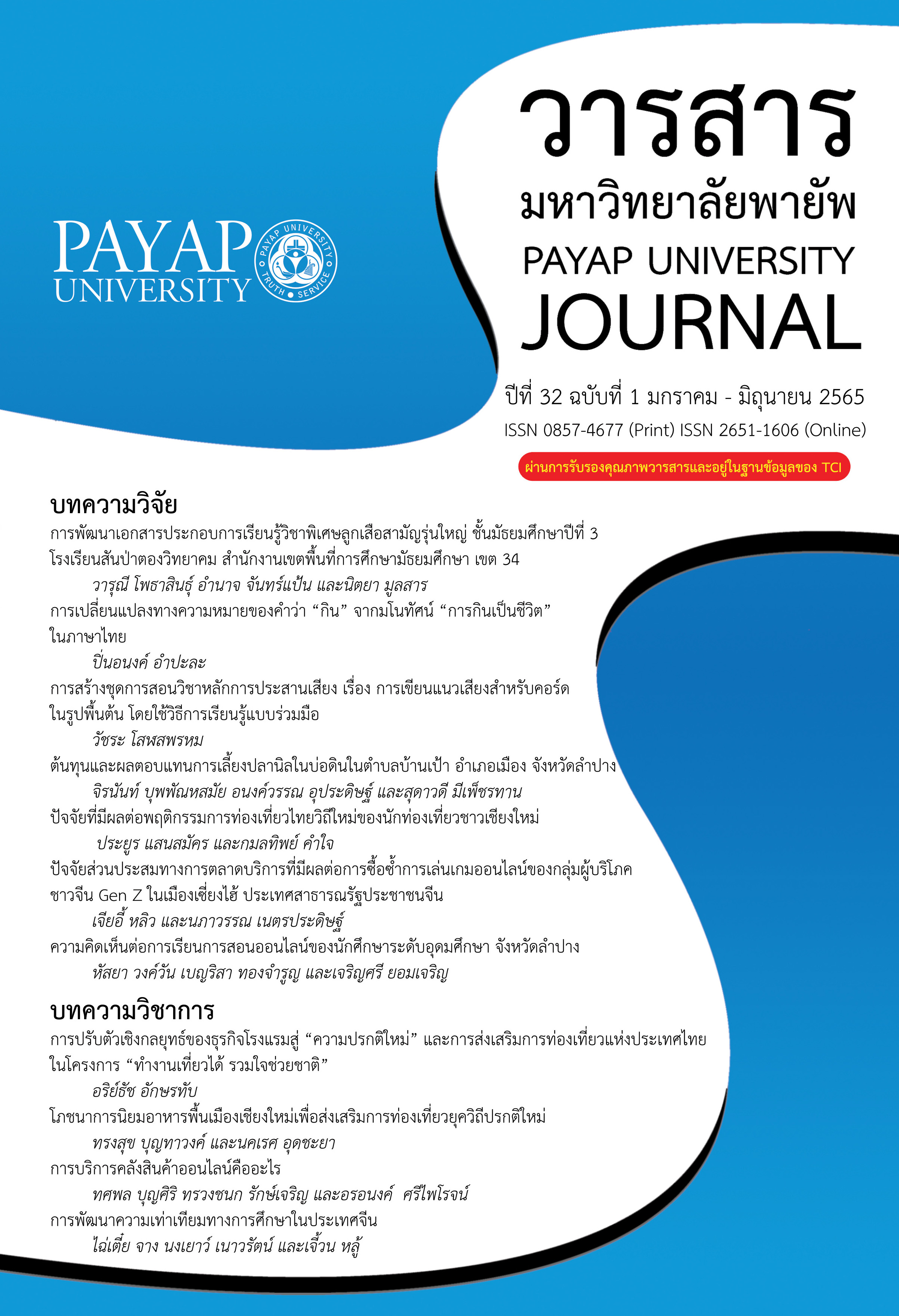ความคิดเห็นต่อการเรียนการสอนออนไลน์ของนักศึกษาระดับอุดมศึกษา จังหวัดลำปาง
Main Article Content
บทคัดย่อ
งานวิจัยนี้มีวัตถุประสงค์เพื่อศึกษาความคิดเห็นของนักศึกษาในสถาบันอุดมศึกษา จังหวัดลำปาง ที่มีต่อการเรียนการสอนออนไลน์ กลุ่มตัวอย่าง คือ นักศึกษาระดับอุดมศึกษาในเขตจังหวัดลำปาง จำนวน 300 คน คัดเลือกแบบเจาะจง เครื่องมือที่ใช้ในการวิจัย คือ แบบสำรวจความคิดเห็นของนักศึกษา ผลการศึกษาพบว่า ส่วนใหญ่เป็นเพศหญิง ทุกคนมีอินเทอร์เน็ตในการใช้งาน ส่วนใหญ่เคยเรียนและเคยสอบในรูปแบบออนไลน์ อุปกรณ์ที่ใช้ในการเรียนและการสอบออนไลน์ คือ คอมพิวเตอร์ระบบสัมผัส และโทรศัพท์เคลื่อนที่ ส่วนใหญ่ใช้อินเทอร์เน็ตในการแชท และสืบค้นข้อมูลเกี่ยวกับการเรียน และใช้บ้านและหอพักเป็นสถานที่เรียนออนไลน์ รูปแบบการเรียนที่นักศึกษาชอบมากที่สุด คือ การเรียนในชั้นเรียน รองลงมา คือ การเรียนออนไลน์แบบคลิปสอน ผลความคิดเห็นการเรียนการสอนออนไลน์ พบว่า นักศึกษาค่อนข้างเห็นด้วยว่าเรียนออนไลน์ทำให้รู้สึกสะดวกและรู้สึกผ่อนคลาย นักศึกษาเห็นด้วยว่าการเรียนออนไลน์ทำให้ขาดปฏิสัมพันธ์กับเพื่อน เกิดแรงกระตุ้นทางการเรียนน้อย และนักศึกษาไม่เห็นด้วยให้มีการปรับการเรียนการสอนเป็นแบบออนไลน์ในอนาคต ด้านผลความคิดเห็นการสอบออนไลน์ พบว่า นักศึกษาเห็นด้วยมากที่สุดว่ามีความกังวลในการสอบออนไลน์ ผู้วิจัยได้นำเสนอแนวทางการจัดการเรียนรู้ออนไลน์ 2 แนวทาง คือ 1) การสอนในชั้นเรียนโดยอัดคลิปไว้ให้ทบทวนบทเรียน และ 2) การเรียนแบบผสมผสาน
Article Details
เอกสารอ้างอิง
กระทรวงการอุดมศึกษา วิทยาศาสตร์ วิจัยและนวัตกรรม. (2563). ประกาศกระทรวงการอุดมศึกษา วิทยาศาสตร์ วิจัยและนวัตกรรม เรื่อง มาตรการและการเฝ้าระวังการระบาดของโรคติดเชื้อไวรัสโคโรนา 2019 หรือโรคโควิด-19 (ฉบับที่ 3), สืบค้นเมื่อ 10 สิงหาคม 2563. https://covid19.mfu.ac.th/?p=253
จักรกฤษณ์ โพดาพล. (2563). การจัดการเรียนรู้ออนไลน์: วีถีที่เป็นไปทางการศึกษา = Online learning management: New normal of education, สืบค้นเมื่อ 26 พฤษภาคม 2563. https://slc.mbu.ac.th/article/28181
ทัตธนันท์ พุ่มนุช. (2555). การศึกษาพฤติกรรมการใช้เครือข่ายสังคม (Social network) เพื่อพัฒนาในการปฏิบัติงานของบุคลากรทางการศึกษาในสำนักงานเขตพื้นที่การศึกษาประถมศึกษานครปฐม. Veridian E-Journal, 5(1), 523-540.
บัณฑิตา อินทรักษา. (2562). การจัดการเรียนรู้ด้วยสื่อสังคมออนไลน์. วารสารศึกษาศาสตร์ มหาวิทยาลัยนเรศวร, 21(4), 357-365.
บุญชู บุญลิขิตศิริ. (2548). ผลของรูปแบบการปฏิสัมพันธ์ทางการเรียนในการฝึกอบรมโดยใช้เกมเป็นฐานบนเว็บที่มีต่อผลสัมฤทธิ์ทางการเรียนของบุคลากรศูนย์ฝึกอบรมและควบคุมระบบเครือข่ายคอมพิวเตอร์ มหาวิทยาลัยนเรศวร. วิทยานิพนธ์ปริญญาครุศาสตรมหาบัณฑิต สาขาวิชาโสตทัศนศึกษา จุฬาลงกรณ์มหาวิทยาลัย.
พิซิต วิจิตรบุญยรักษ์. (2554). สื่อสังคมออนไลน์: สื่อแห่งอนาคต. วารสารนักบริหาร, 34(1), 99-103.
วิทยา วาโย, อภิรดี เจริญนุกูล, ฉัตรสุดา กานกายันต์, และจรรยา คนใหญ่. (2563). การเรียนการสอนแบบออนไลน์ภายใต้สถานการณ์แพร่ระบาดของไวรัส COVID-19: แนวคิดและการประยุกต์ใช้จัดการเรียนการสอน. วารสารศูนย์อนามัยที่ 9, 14(34), 285-298.
สุขนิษฐ์ สังขสูตร และจอมเดช ตรีเมฆ. (2564). ความพึงพอใจต่อรูปแบบการเรียนการสอนออนไลน์ในสถานการณ์การระบาดของโรคติดเชื้อโควิด-19 ของมหาวิทยาลัยรังสิต. ใน วิทยาลัยนวัตกรรมสังคม มหาวิทยาลัยรังสิต, การประชุมวิชาการระดับชาติครั้งที่ 11 ด้านสังคมศาสตร์และมนุษยศาสตร์ ศึกษาศาสตร์ การจัดการและศิลปะ มหาวิทยาลัยรังสิต ประจำปี 2564, (น. 1-12). กรุงเทพฯ: สถาบันวิจัย มหาวิทยาลัยรังสิต
สุธิดา พัฒนศรีวิเชียร. (2562). กลยุทธ์การใช้สื่อสังคม (Social media) เพื่อรณรงค์ทางการเมืองในยุคสังคมเครือข่าย. วารสารมหาวิทยาลัยพายัพ, 29(1), 27-41.
Angelo,T. A. & Cross, P. K. (1993). Classroom assessment techniques: A handbook for college teachers (2nd ed.). San Francisco: Jossey-Bass.
Likert, R. (1967). The method of constructing and attitude scale. In M. Fishbein (Ed.), Readings in attitude theory and measurement. New York: Wiley & Sons.
Seagren, A., Watwood, B. (1996). The virtual classroom: What works?, Retrieved April 10, 2020, from https://scholar.Google.com/citations?view_op=view_citation&hl=en& user=5plD-80AAAAJ&citation_for_view=5plD-80AAAAJ:d1gkVwhDpl0C
Taylor, A. (2014). A look at web-based Instruction today: An interview with Badrul Khan, Part 1, Retrieved May 26, 2020, from http://elearnmag.acm.org/archive.cfm? aid=2590180


